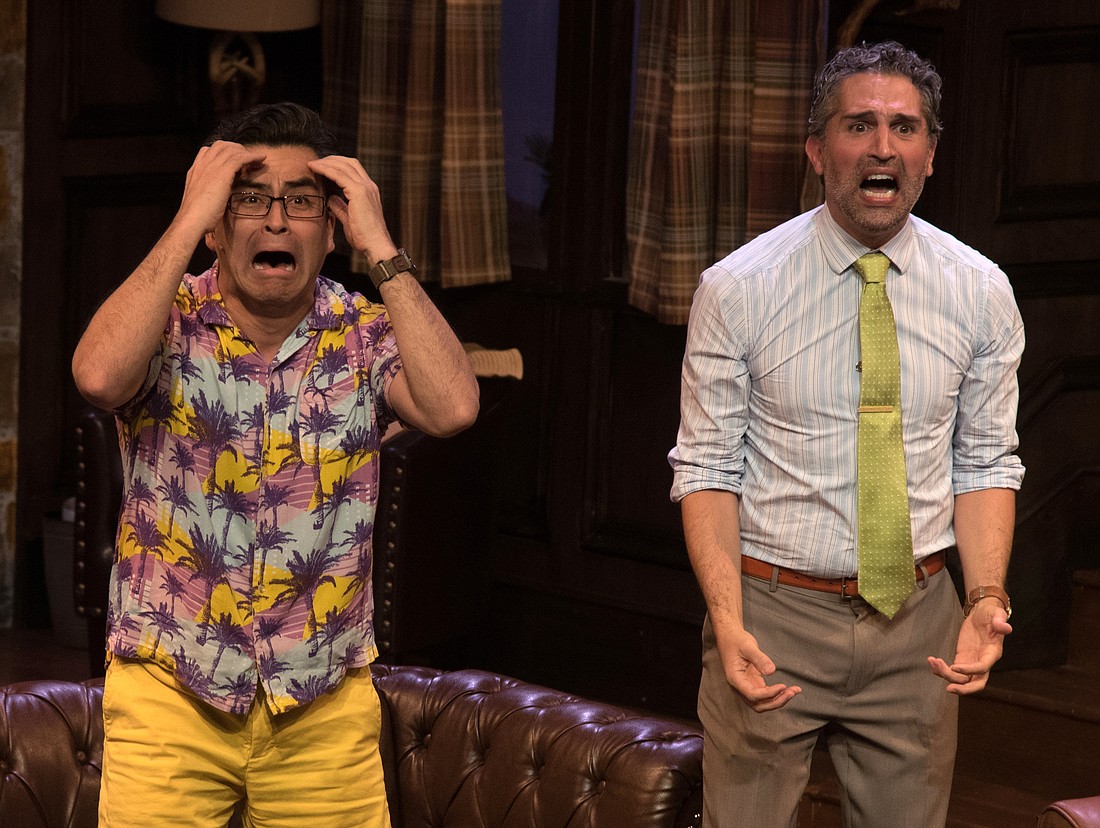- July 26, 2024
-
-
Loading

Loading

Novelists and screenwriters often paint an unflattering portrait of Hollywood.
Judging by movies like Robert Altman’s “The Player” and novels like Nathaniel West’s “The Day of the Locust,” Tinseltown is a heartless exploitation machine that grinds up writers and their words.
Will Osborne and Anthony Herrera’s “Smoke & Mirrors” falls squarely in that tradition at Florida Studio Theatre.
The first act opens with a screenwriter’s grievance. Clark Robinson (Alberto Bonilla) is the scribe in question; a creative if highly nervous screenwriter. Clark’s in a movie-making partnership called “Three Happy Fellas.”
Director Hamilton Orr (Ben Cherry) and movie star Derek Coburn (Jack Gerhard) are the other two fellas, but Clark’s a most unhappy fella. He bemoans Hamilton’s Procrustean mutilation of his creative vision.
“Vicksburg” is the most recent outrage. The company’s last film was a hit. Clark wrote the screenplay — and it was his passion project. But Hamilton got the studio to green light the flick with the promise that Hollywood hunk Derek would play the lead role. (Hamilton got him to sign by making him a creative partner.)
After that, the meathead proceeded to rewrite his lines and deliver them just as badly. The result? Critical scorn — and boffo box office numbers.
Three Happy Fellas is now working on a sequel. The creative team’s ensconced in the Mississippi state governor’s mansion on an isolated private island in the Gulf of Mexico. (Mississippi needs Hollywood money, evidently).
But the film deal is a package deal. By studio decree (and the terms of his partnership), Derek stays in the picture — or there’s no picture.
The writer’s outraged. The director claims to feel the same artistic outrage. This crowd-pleasing dummy is ruining his creative vision, too! For an added twist of the knife, there’s a serious actor who’d love to take his place!
Hmmm…
Hamilton jokingly suggests that they kill Derek — for their art. Ha-ha. Then you realize he’s not joking.
Clark initially resists Hamilton’s murderous pitch — but finally agrees to his scheme for Derek’s final exit. How to kill him and get away with it? Hamilton’s got it all figured out.
They’ll tell the dim actor they’ve written a new ending to “Vicksburg II” — a scene where Derek’s character commits suicide. Then they’ll get him to rehearse the scene and switch the unloaded gun with a loaded gun.
Bang! No more Derek. A tragic accident! And that’s a wrap.
Or maybe not.
They don’t call this play “Smoke & Mirrors” for nothing.
All I can say is somebody either does or doesn’t die. And somebody’s scheme either goes or doesn’t go as planned. This play is a Mousetrap, as in the Parker Brothers’ board game, not the Agatha Christie play.
Giving the ending away really would be a crime.
Suffice to say it’s smart, and very, very funny. Director Catherine Randazzo finds just the right tone to keep you laughing. Her tightrope walk is no cakewalk.
“Smoke & Mirrors” walks the line between parody and homage.
(The play’s elaborate bits of business echo half the classics on PBS “Mystery Theatre.”) But the bits are always just a wee bit off. Something’s happening, but you don’t know what it is. Aside from the fact it’s funny.
The actors are equally great at high-wire silliness. Bonilla’s high-strung Clark is the low fella on the totem pole. He stammers and stutters like a standard issue nebbish. Then you realize his commitment to creative vision isn’t a joke.
Cherry’s Hamilton has one key feature — he’s a manipulator. (One who gleefully sees himself as a puppet master.) He can be charming when he has to be — or a bully when he can get away with it.
Alanna Smith plays Hamilton’s wife Barbara as one of his willing puppets. (Maybe.) She delivers a highly cinematic portrayal as a languorous femme fatale. She’s exactly what Hamilton wants her to be.
(Or maybe just what he expects her to be.)
After the deed is done, Justin Ness makes the scene as Sheriff Leroy, a classic country bumpkin lawman investigating the crime scene. You figure, like Peter Falk’s Columbo, he’s just playing dumb.
Then you realize he’s just plain dumb. That equally applies to Gerhard’s Derek. He’s a tool, and not particularly sharp. But moviegoers love him — and he agrees with their opinion.
The action on stage is a few steps away from realism. Isabel and Moriah Curley-Clay’s overstuffed set has more stuffed, dead animals than Linger Lodge. It’s impressive — and slightly creepy. (And where did they get those crispy critters anyway?)
Erin Barnett’s costumes look like costumes. For this play, that’s a compliment. Because its world is not the real world.
Osborne and Herrera’s script sparkles with fast-paced dialog in the Preston Sturges tradition. A recent revision scrubbed away the 1991 anachronisms. (Presto-chango! Floppy discs become flash drives; Eleanor Roosevelt is now Barbara Bush!) The only oversight was a reference to film photography.
“Smoke & Mirrors” tickles your funny bone without insulting your intelligence.
Smart and funny is a great combination — and a rare one. With murder mysteries (comic or otherwise) I usually see the twist ending coming a mile away. With “Smoke & Mirrors,” I didn’t.
Nice trick.